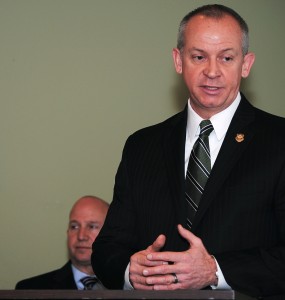Most significant advancement in expansion of treatment services in over a decade
Newark, DE – Building on efforts to reduce the number of individuals and families whose lives are impacted by addiction, Governor Markell today outlined a proposal for increased public treatment and recovery services in Delaware. Last year, 185 Delawareans, or about one person every other day, died from suspected overdoses.
“Across our state, families are worried that if their loved ones aren’t soon connected to treatment, any single day could be their last,” said Governor Markell, s peaking in Newark at a sober living Oxford House for people in recovery. “When someone is ready for treatment, they shouldn’t be told there is not a bed available for them. Our commitment, and the commitment of our providers, is to take whatever step is necessary to connect people to treatment.”
peaking in Newark at a sober living Oxford House for people in recovery. “When someone is ready for treatment, they shouldn’t be told there is not a bed available for them. Our commitment, and the commitment of our providers, is to take whatever step is necessary to connect people to treatment.”
The Governor previewed the efforts in his State of the State address, saying the state must make a substantial investment in services for those struggling with substance use disorders and noting that heroin incidents more than doubled in 2012 alone.
Specifics on the Governor’s proposal for increased services include:
- Increasing withdrawal management services statewide, both at the new detox clinic scheduled to open by June 1 in Harrington and at the existing center in New Castle County. Clinics will match services to individuals’ needs, rather than using a one-size-fits-all approach.
- Doubling the number of sober living residential beds statewide from 60 to 120, allowing more individuals who are in the early stages of recovery to live in safe, secure housing that is free from drugs and alcohol.
- Providing a strong foundation for long-term recovery for young people age 18 to 25 who are beginning their recoveries from opiate addiction by doubling the number of residential treatment beds from 16 to 32.
- Increasing accessibility to residential treatment programs statewide by opening new programs statewide and closing the current treatment program on the Governor Bacon Campus in Delaware City. These changes are expected to be completed by the end of the year and will result in the addition of 17 treatment beds.
The proposal would support several efforts already underway, including the recently launched information website, www.HelpIsHereDE.com, which features prevention information and tips for parents and teens, along with treatment and recovery resources for those already impacted by addiction.
“Our actions are guided by the voices and the courage of those who have been directly impacted by this disease,” said Rita Landgraf, Secretary of the Department of Health and Social Services (DHSS). “Through our work with Attack Addiction – which includes families of loved ones lost to the disease as well as those living in recovery – we have gained valuable insight into the gaps in the treatment system, and we are working to fill those gaps. We must ensure that we not only expand the capacity for life-saving treatment and recovery services but that we offer levels of care that meet the needs of those whose personal stories drive our efforts.”
The proposal for increased public treatment and recovery services is one of three areas the administration is focusing on in terms of dealing with the addiction crisis. DHSS and the Children’s Department are working with school superintendents and school nurses to address addiction from a prevention and education standpoint, while the Attorney General’s office, Department of Correction (DOC), and Division of Professional Regulation are focusing on the criminal justice and control aspects of addiction. Attorney General Matt Denn and DOC Commissioner Robert Coupe were both present for today’s event.
“A significant percentage of offenders who enter our State’s correctional system suffer from addiction and without the support of proper treatment opportunities in the community they face a greater risk of recidivism,” said Coupe. “The Governor’s proposal to strengthen community-based drug treatment services represents the kind of bold commitment Delaware needs to provide a cost-effective alternative to incarceration, support those who suffer from addiction, and give them the helping hand they desperately need to achieve and maintain their sobriety.”
Support for increased addiction services has been noticeable both within the healthcare and advocacy communities, as well as among members of General Assembly. During his remarks today, the Governor acknowledged several legislators for their commitment to increasing services and for their support of reform efforts necessary in the public treatment system.
“It is good to have addiction take a prominent place in the Governor’s initiatives,” said Rep. Mike Barbieri, chair of the House Health & Social Services Committee. “I believe that we have to identify and fill the gaps in our service delivery system and support our providers in the transformation and strengthening of this system.”
On Thursday, the Governor will present his full budget recommendation for FY16, which will detail spending plans with regard to treatment and recovery for addiction. The total recommended budget for this proposal is $4.5 million.
“Drug addiction is truly a health care epidemic, like countless other diseases. I’m glad the governor is making it a priority,” said Sen. Bethany Hall-Long, D-Middletown, who chairs the Senate Health & Social Services Committee. “The victims of addiction extend far past the individual user. It can tear apart households, families and even communities. Offering treatment and a path to recovery for those who need it most is a vital public service, and it benefits all of us in the long run.”
###